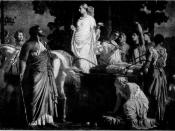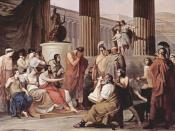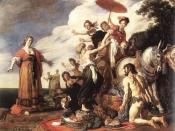In Homer's The Odyssey, a poem about an aging hero, Odysseus, trying to find his way home, there are several female characters that can lead us to draw conclusions about the roles of women in ancient Greece. Homer does this in two ways: the first way is he uses supporting female characters, such as Nausikaa and Arêtê, to represent the classic roles of females. The second way is that that he has a cast of main female characters, such as Athena, and Calypso. Both of these women represent a trait that was not stereotypically female, and he makes sure to point to point this out. Throughout the poem, one can draw from the text conclusions about the roles of women in ancient Greece.
Homer uses Arêtê, wife of AlkÃÂnoös, to outline the ideal woman in this time period. Arêtê e is beautiful, wise, and godlike. Athena demonstrates it when she is speaking of her to Odysseus in Phaiakia:
No lady in the world, no other mistress of a man's household, is honored as our mistress is, and loved, by her own children, by Alkinoos, and by the people.
When she walks the town they murmur and gaze, as though she were a goddess. No grace or wisdom fails in her; indeed just men in quarrels come to her for equity. (113)
Homer is pointing out that she is the "perfect" woman. Everyone in the town loves her because of her godlike beauty, and because she is graceful and wise. Her own husband, AlkÃÂnoös trusts her judgment, which is proven when he asks her to "...bring here [me] a chest, the finest one; a clean cloak and tunic; stow these things..." in order to prepare for Odysseus's departure (137). However, in this request, he refers to her as "lady", making...


